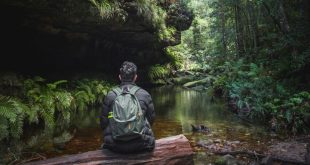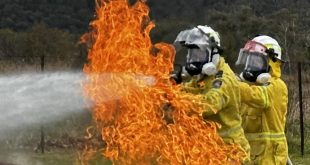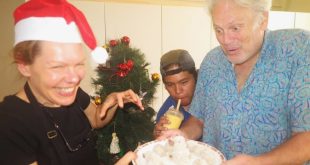There was a lot happening at the first ever Planetary Health Day in Katoomba (Video: Kalani Gacon)
Story by Linda Moon
The first Blue Mountains Planetary Health Day was held on 24 February 2024 in Katoomba, and was a huge success with an estimated 600 attendees. With the goal of equipping people with the knowledge and resources to achieve their sustainability goals, the day featured workshops, stalls, activities and much more.
Key Points:
- The Blue Mountains’ first Planetary Health Day was held on 24 February, 2024 at the Planetary Health Precinct in Katoomba.
- An uplifting, informative and community-focused day of sharing and caring about the planet, it centred on ways to make our sustainable goals become reality.
- With the event a success, it’s hoped Planetary Health Day can be a regular event.
It was that trademark misty, drizzly day in the mountains. But the rain didn’t stop the locals from turning up to the Blue Mountains’ first ever Planetary Health Day.
The day featured fun stalls, free workshops, talks, exhibits and activities designed to help us tick off our personal sustainability goals and support the health of the planet.
Mayor Mark Greenhill opened the event, followed by a stirring ‘Welcome to Country’ by Chris Tobin (on behalf of the Dharug traditional custodians) and Kelsie King (on behalf of Gundungurra).
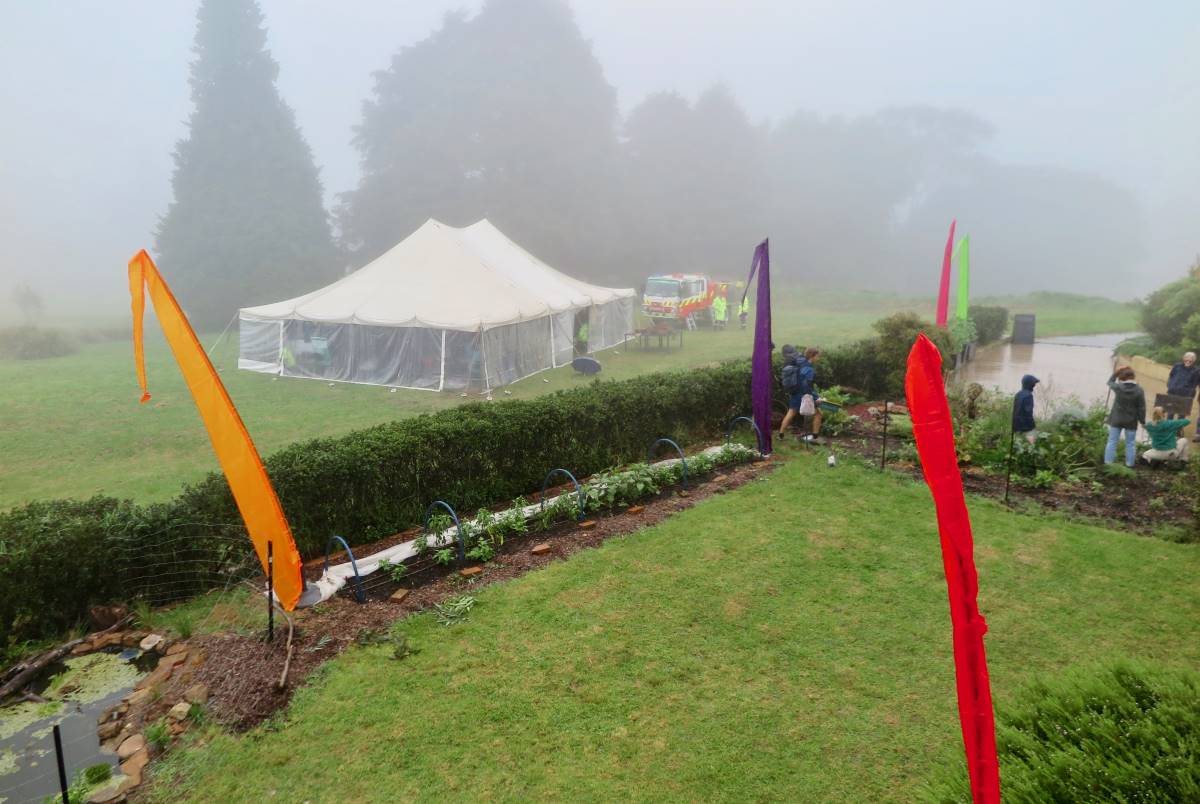
Despite the wet weather the Planetary Health Precinct (the former Katoomba Golf Course) catered for over 30 activities throughout the day in the gardens, the main building and in a large marquee. (Photo: Linda Moon)
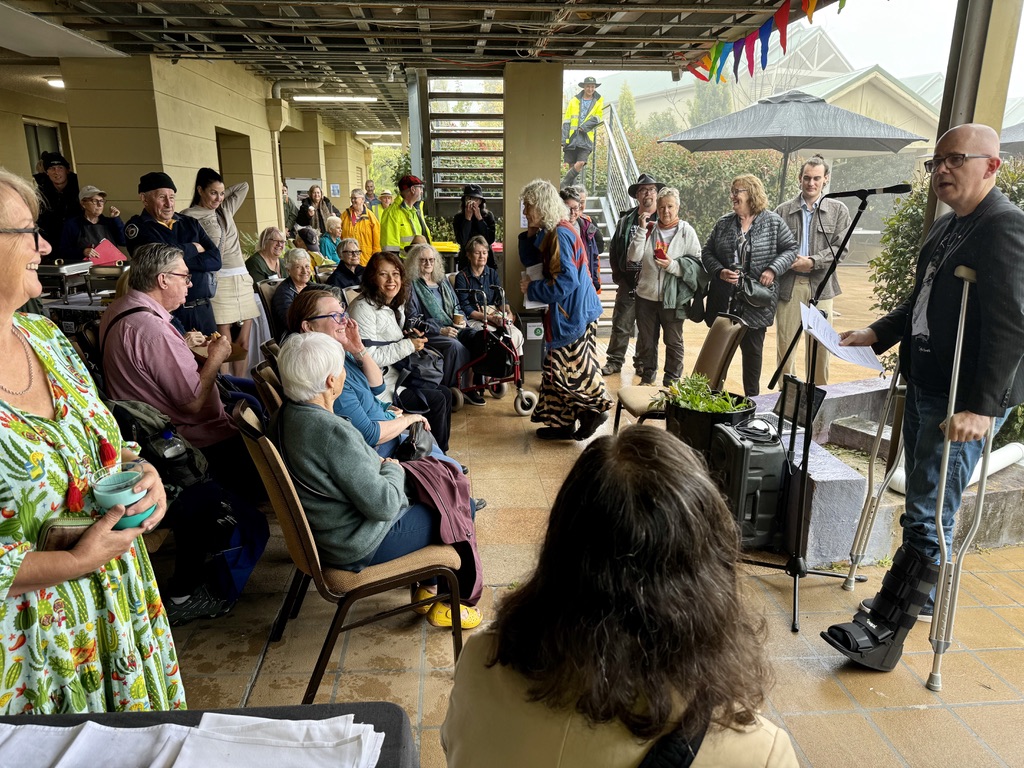
The opening of the event by Mayor Mark Greenhill (Photo: Lis Bastian)
Our relationship to Country
Chris explained that beginning with a Welcome to Country was highly appropriate to the occasion as it trains us to acknowledge our relationship to Country. He said: “It [Country] extends beyond our property to all creatures, our old people, generations beyond us, the people waiting in earth for their time. It is not a resource for us to gobble up, not a commodity, but a home for us and generations after us.”
In her speech Kelsie said: “A healthy Country means healthy people.”
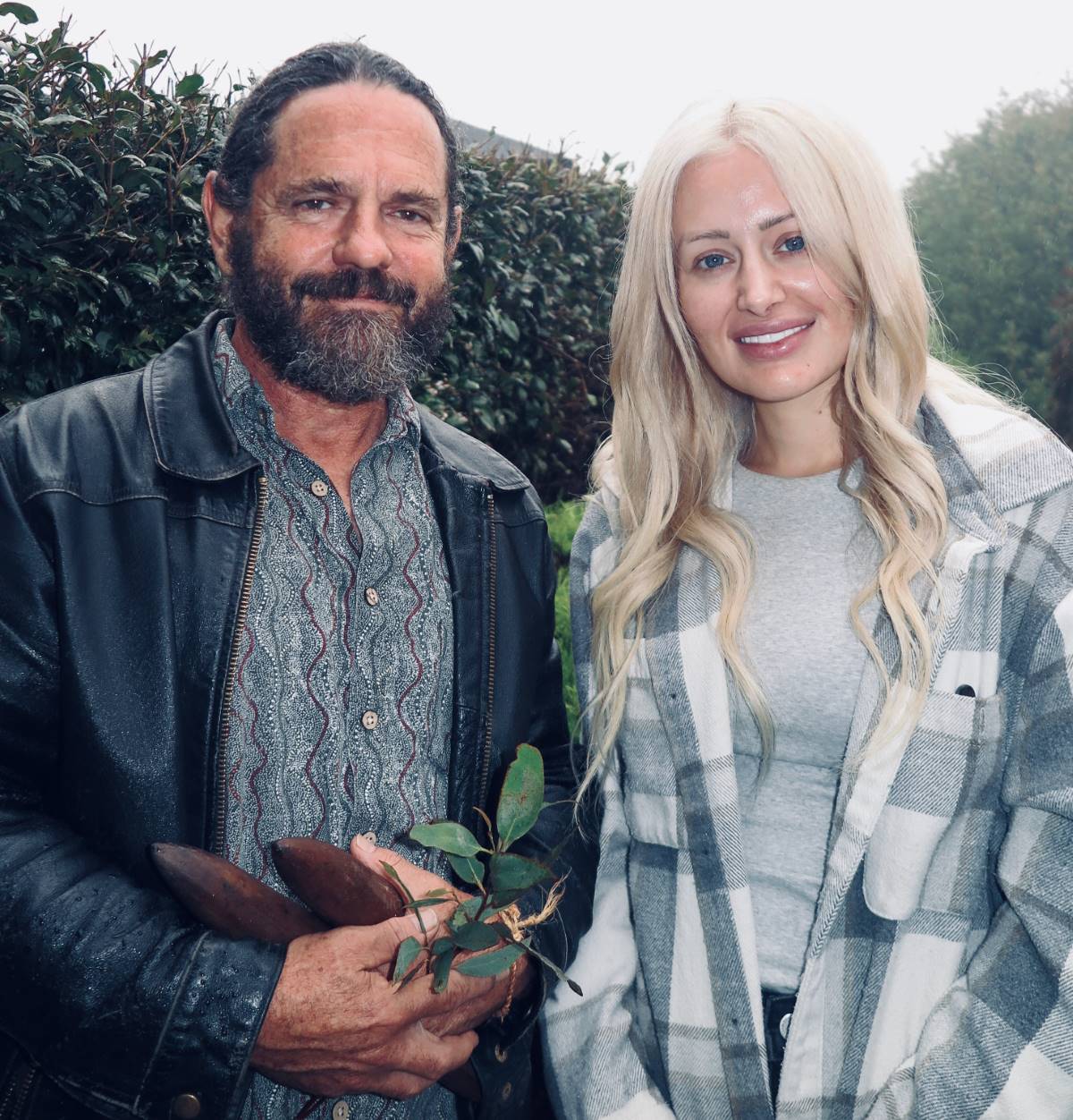
Chris Tobin and Kelsie King. Their ‘Welcome to Country’ encourages us to deepen our relationship to the land and help preserve it for future generations. (Photo: Linda Moon)
Following the Welcome to Country the Wagana dancers put on a stirring performance in the mist.
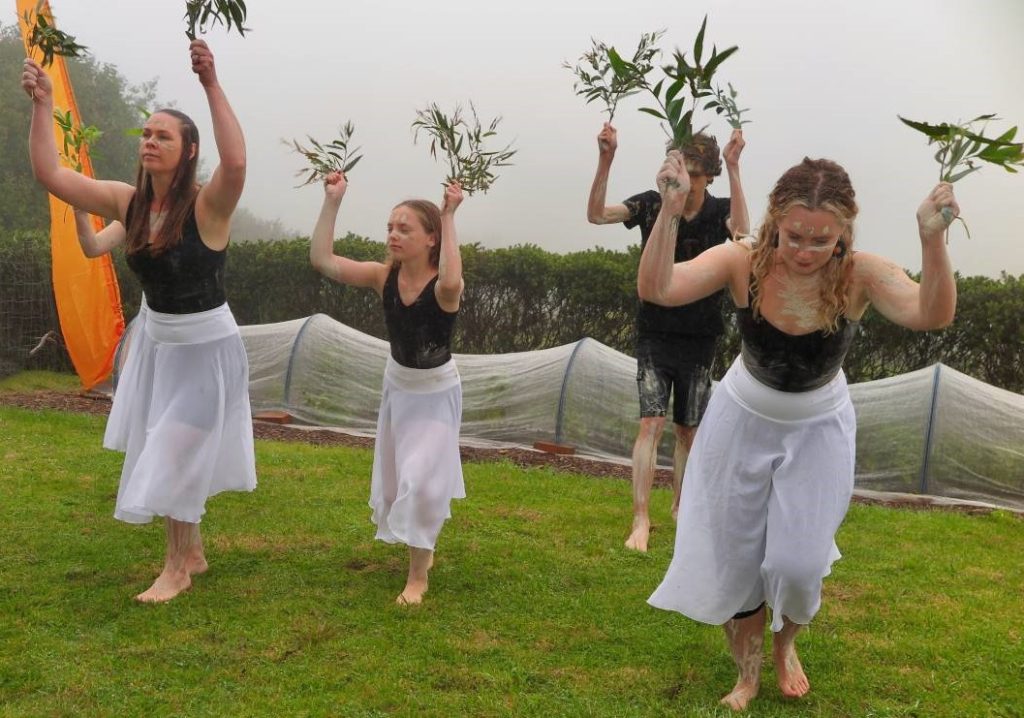
The Wagana Dancers helped open the event. (Photo: Linda Moon)
One-stop shop for sustainable goals
Organiser and Senior Program Lead for the Planetary Health Initiative, Lis Bastian, described the event as a “one-day, one-stop shop” for our sustainability goals. “We understand that most people are overloaded,” she said. “We often can’t get to doing all the things we feel we could or should do because life is so busy and stressful. We’re hoping to make it easier by bringing a lot of options together in one spot at one time.”
Encouraging collaborative action at the local level, she said: “We’re trying to create a swarm for planetary health, emulating the way that birds and bees all start to work together in unison: people feeling the need for change in their whole being. And we need to change and act quickly together. That’s what we’re trying to achieve here, by bringing everyone together to see how enjoyable it can be and how we can all support one another to move together to a better way of living for ourselves and the planet.”

A chance to connect with community groups, practical skills, experts and businesses in the sustainability space. Pictured: Permaculture Blue Mountains (Photo: Linda Moon)
Stalls, talks and workshops
Over 30 participants providing stalls, workshops and talks, focused on ways to save money, reduce disaster risk and reduce our environmental footprint. Many diverse topics were covered: from how to use your waste bins properly and what to consider when installing solar panels, to learning about Home Energy Efficiency Assessments from MKC Building Design, to learning about Hempcrete (a fire resistant building material) with Kirstie Wulf from Shelter Building Design.
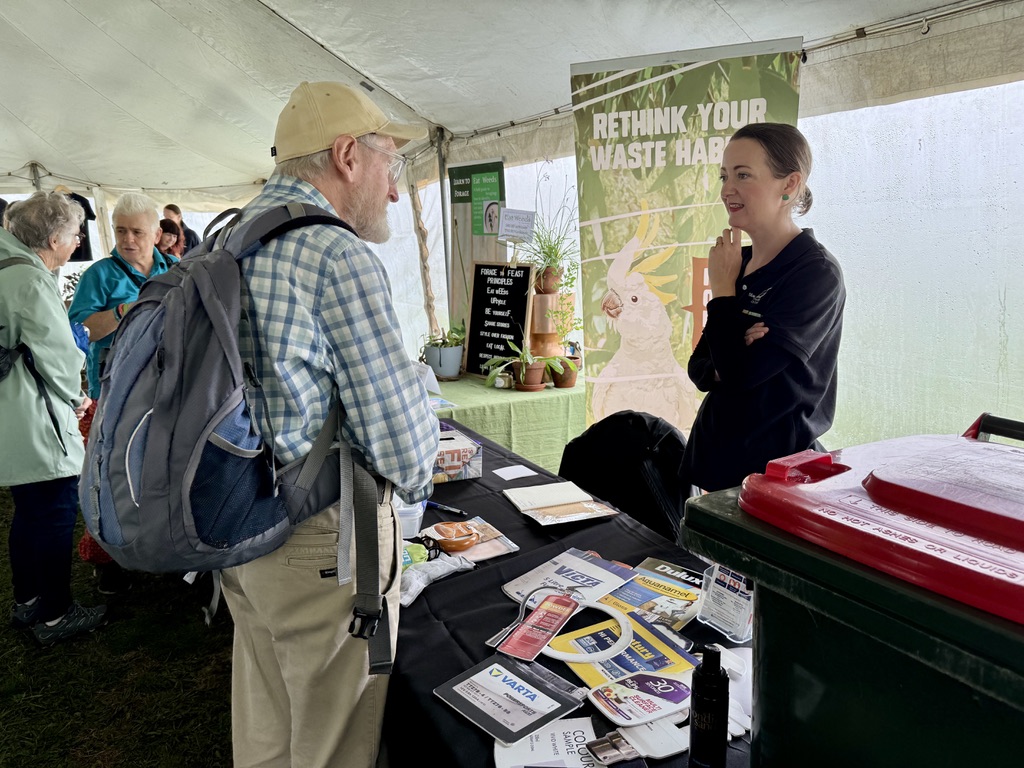
Carly Cura from Council’s Waste and Sustainability Team (Photo: Lis Bastian)
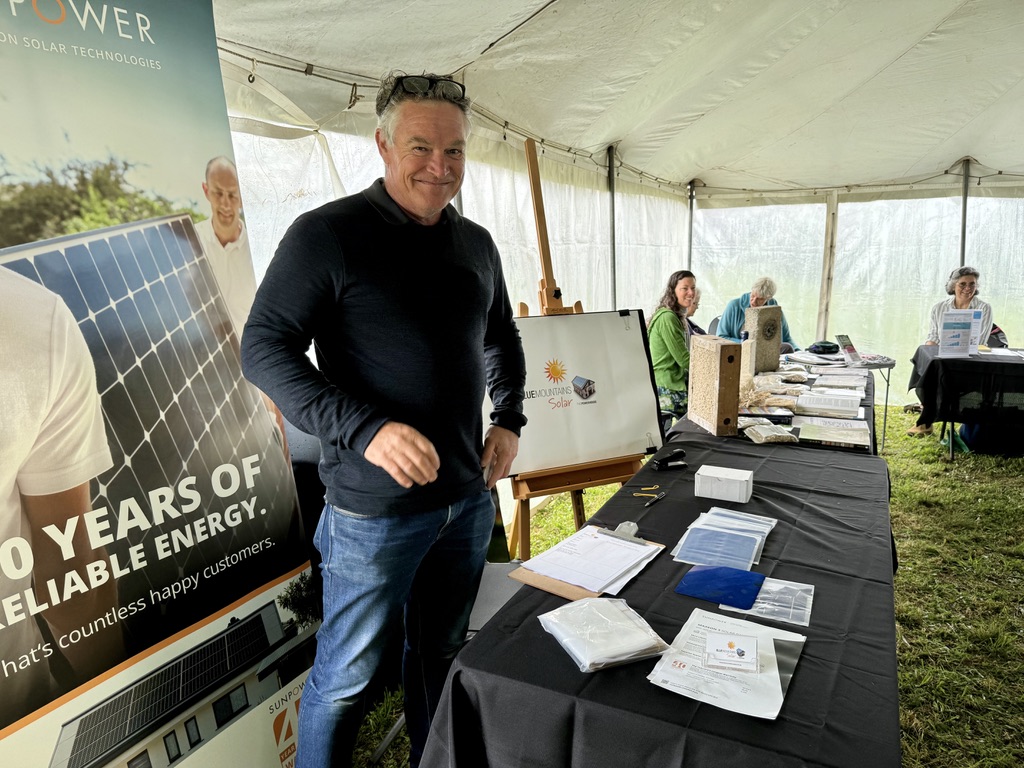
Blue Mountains Solar provided advice on installing solar panels (Photo: Lis Bastian)
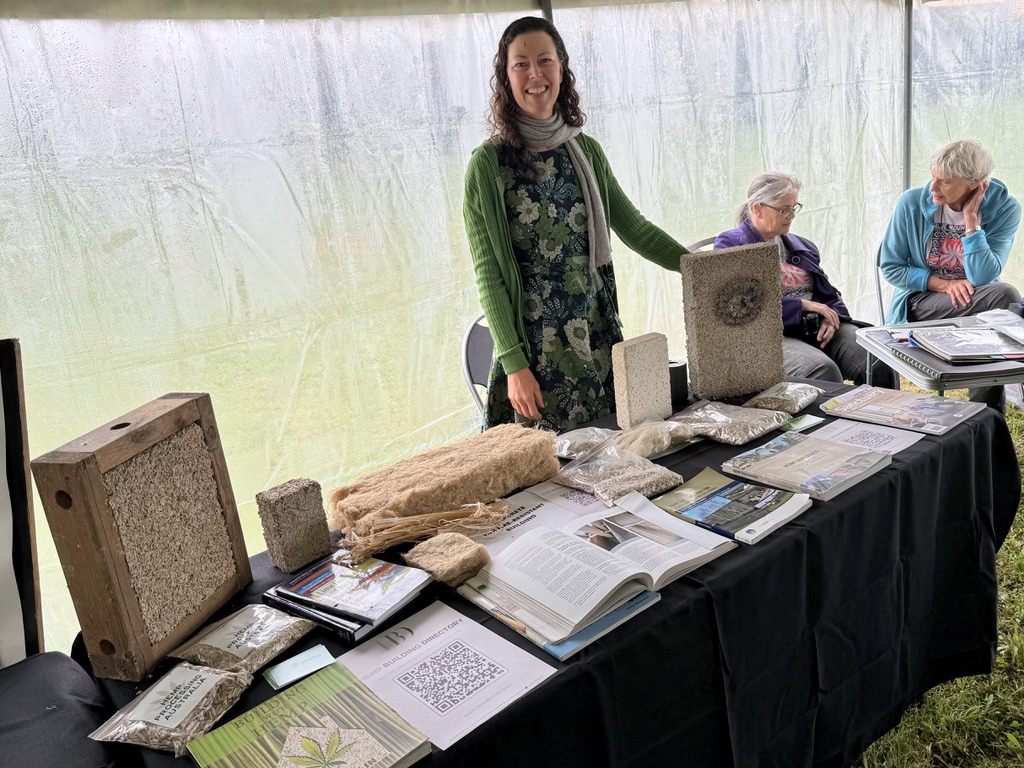
Kirstie Wulf from Shelter Building Design had a stall and gave a comprehensive presentation on Fire-Resistant Building with Hempcrete. (Photo: Lis Bastian)
Talks commenced with a Drip Irrigation presentation, followed by Chris Tobin’s presentation on Dharug Culture.
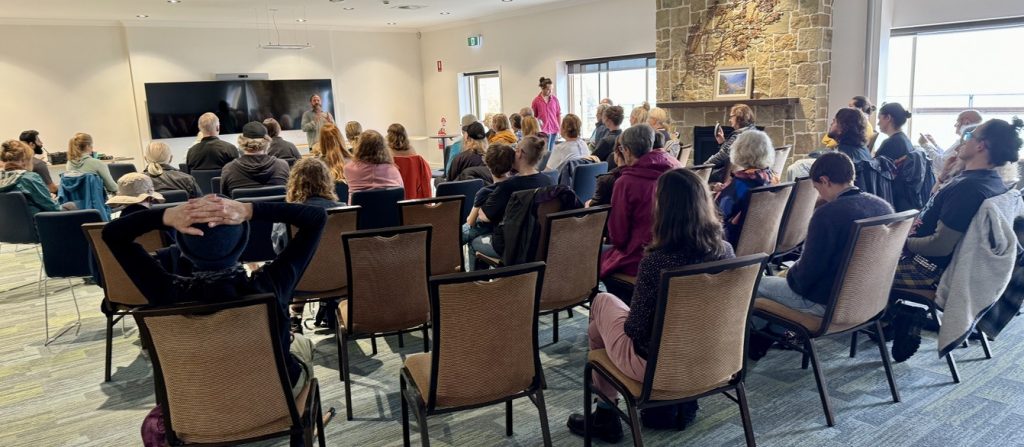
Chris Tobin’s presentation on Dharug Culture (Photo: Lis Bastian)
There was the chance to get a discount on a water tank through a Community Water Tank Bulk Buy and more.
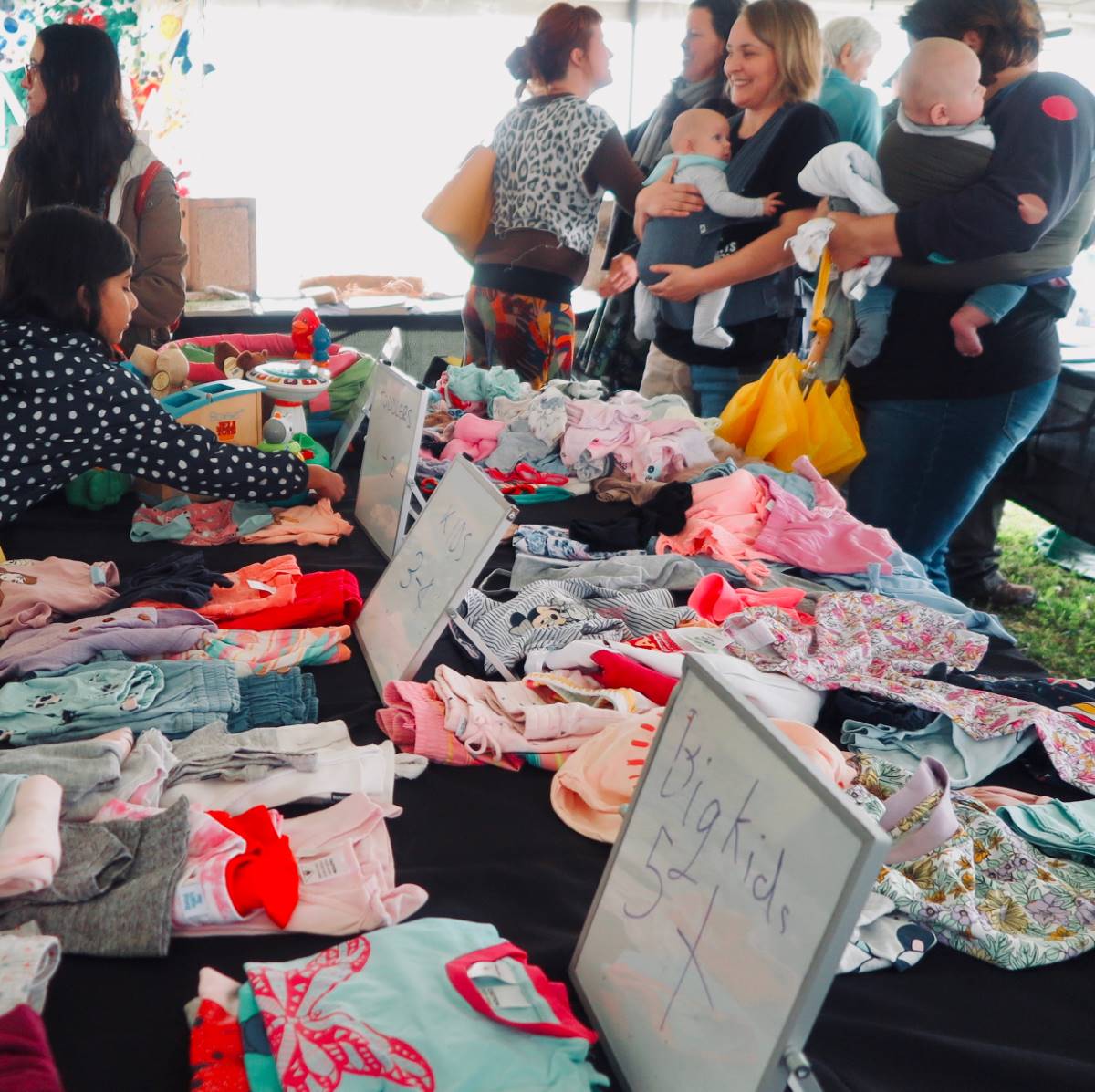
Parents exchanged clothing and smiles at a Kid’s Clothing and Toy Swap organised by Blue Mountains Parents For Climate. (Photo: Linda Moon)
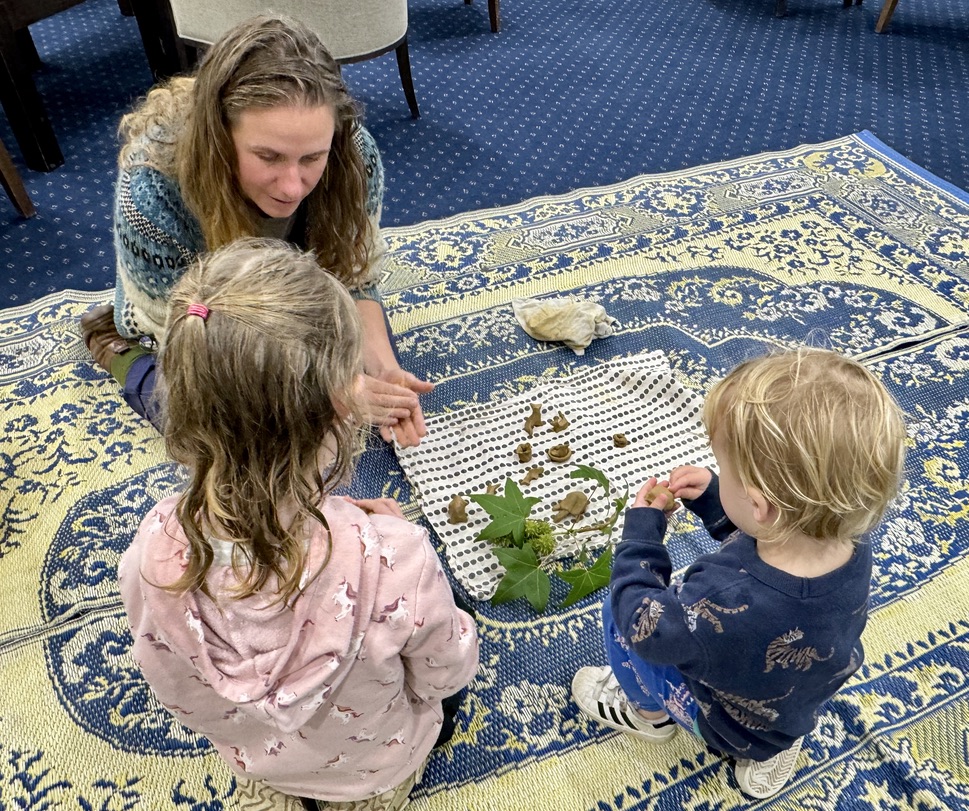
There were activities for all ages, with Sarah Daniel from Kindle Hill engaging very young people in claywork (Photo: Lis Bastian)
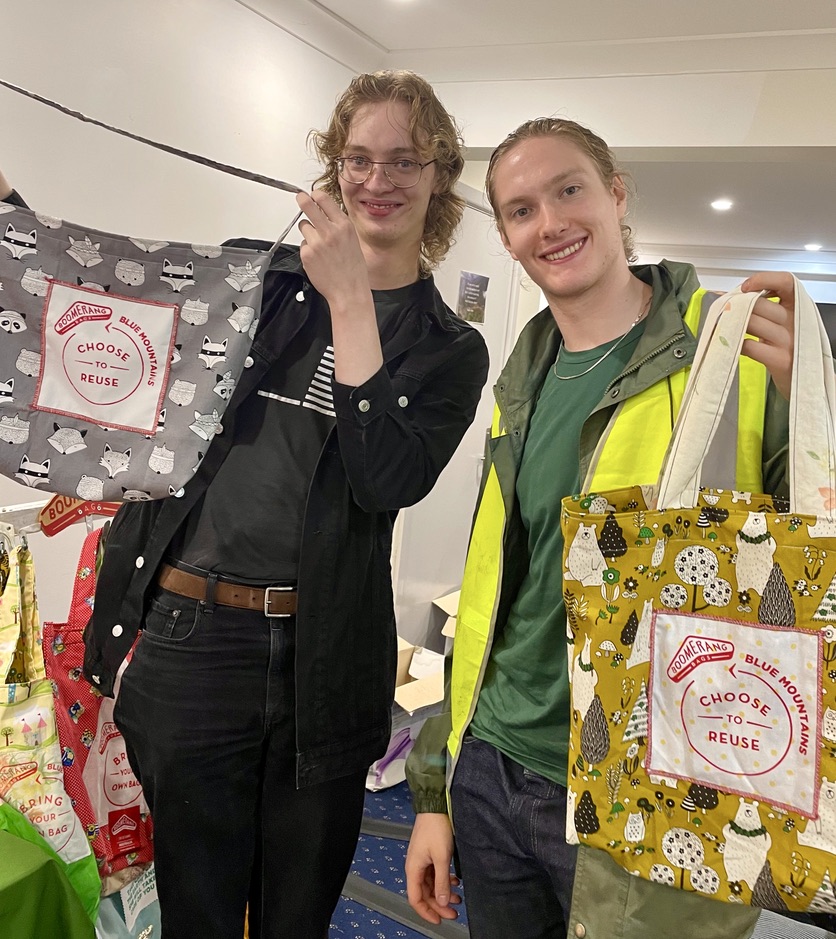
Other young people participated in the Upcycling Fashion Workshop and in learning how to sew their own Boomerang Bags. (Photo: Maria de Luca)
Meet the celebs and experts
‘Off-grid Chippendale Sustainable House guy’, Michael Mobbs installed a ‘Cool Seat’ at the Precinct with Ian Collins of WaterUps. A Cool Seat, as Mobbs put it, is “a seat, garden bed and compost in one.”
Designed with wicking garden beds below composting baskets, it can hold 150 litres of food waste. According to Mobbs, it can transform food waste into compost within three weeks. Other advantages include minimal watering, worms and compost juice. The structure also keeps rats out.
The wicking design, an Aussie creation by Ian Collins and Vince Hunt of WaterUps, recently won the prestigious Groene Sector Innovation Award in the Netherlands.
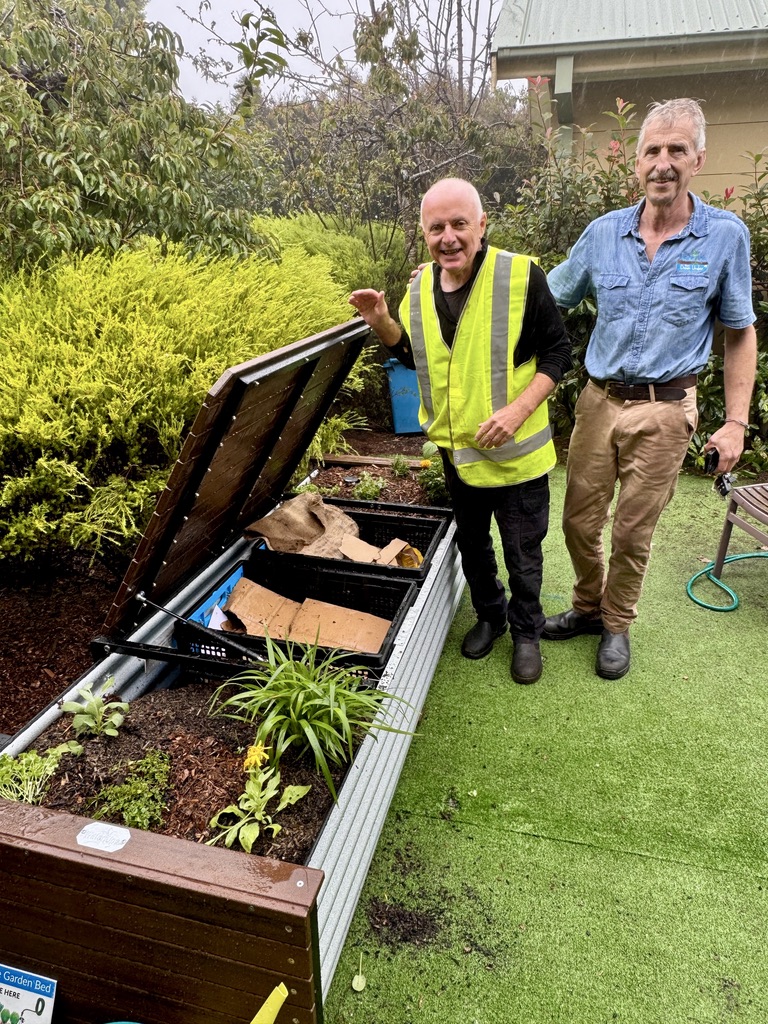
Michael Mobbs (L) and Ian Collins (R) installing a ‘Cool Seat’ on the site. (Photo: Lis Bastian)
Eat the weeds
The public had the chance to sample unique dishes, like the delicious Three Weed Salsa Verde on crackers and Wild Fennel Seed Cookies, from the Eat Weeds book by mushroom and foraging expert Diego Bonetto.
Stylist, forager and foodie, Marnee Fox (Diego’s partner the other half of Forage to Feast), showcased numerous examples of edible weeds and fungi, and enthralled many.
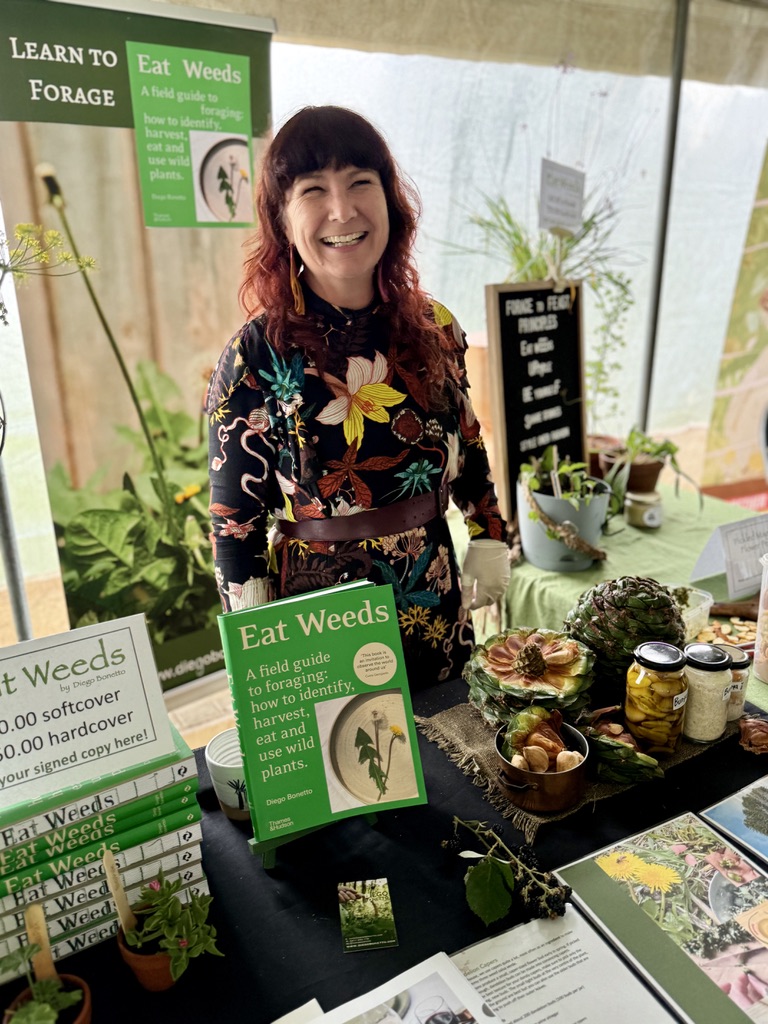
Photo: Marnee Fox manning the popular ‘Eat Weeds’ stall. (Photo: Lis Bastian)
Growing your own food
Growing food was a big topic of the day. Permaculture Blue Mountains, Mid Mountains Seed Savers and Blackheath Community Farm were present to answer questions. Gardening books, locally grown seeds and plants were also available for sale.
Permaculture educator and grower, Rhiannon Phillips of Mountains Gourmet, led a well-attended workshop on drip irrigation.
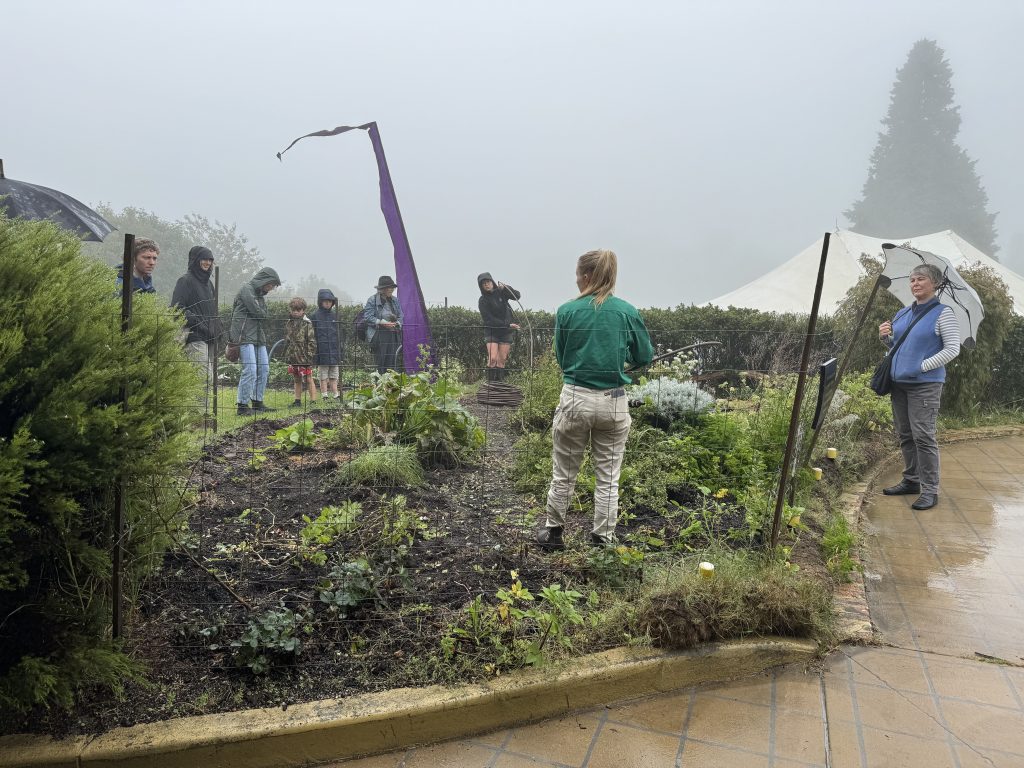
Rhiannon Phillips from Mountains Gourmet demonstrating how to install drip irrigation after her presentation (Photo: Lis Bastian)
Gardeners were also able to inspect examples of waterwise gardening (drip irrigation and wicking beds) constructed on the site, plus a demonstration pond.

Growing your own organic food – a fun way to help the planet and yourself. (Photo: Linda Moon)
Sustainable food
Shopping locally and eating fewer animal products are some of the easiest ways to reduce our environmental impact on the planet. To help showcase plant-based food, tasty locally-produced vegan and vegetarian foods were available for sale. Dishes included pakoras and lentil dahl using hand-blended spices supplied by Bibi’s Kitchen.
“Growing lentils actually helps the planet,” Lis said. “Lentils put nitrogen into the soil, they’re low cost and one of the healthiest things you can eat.”
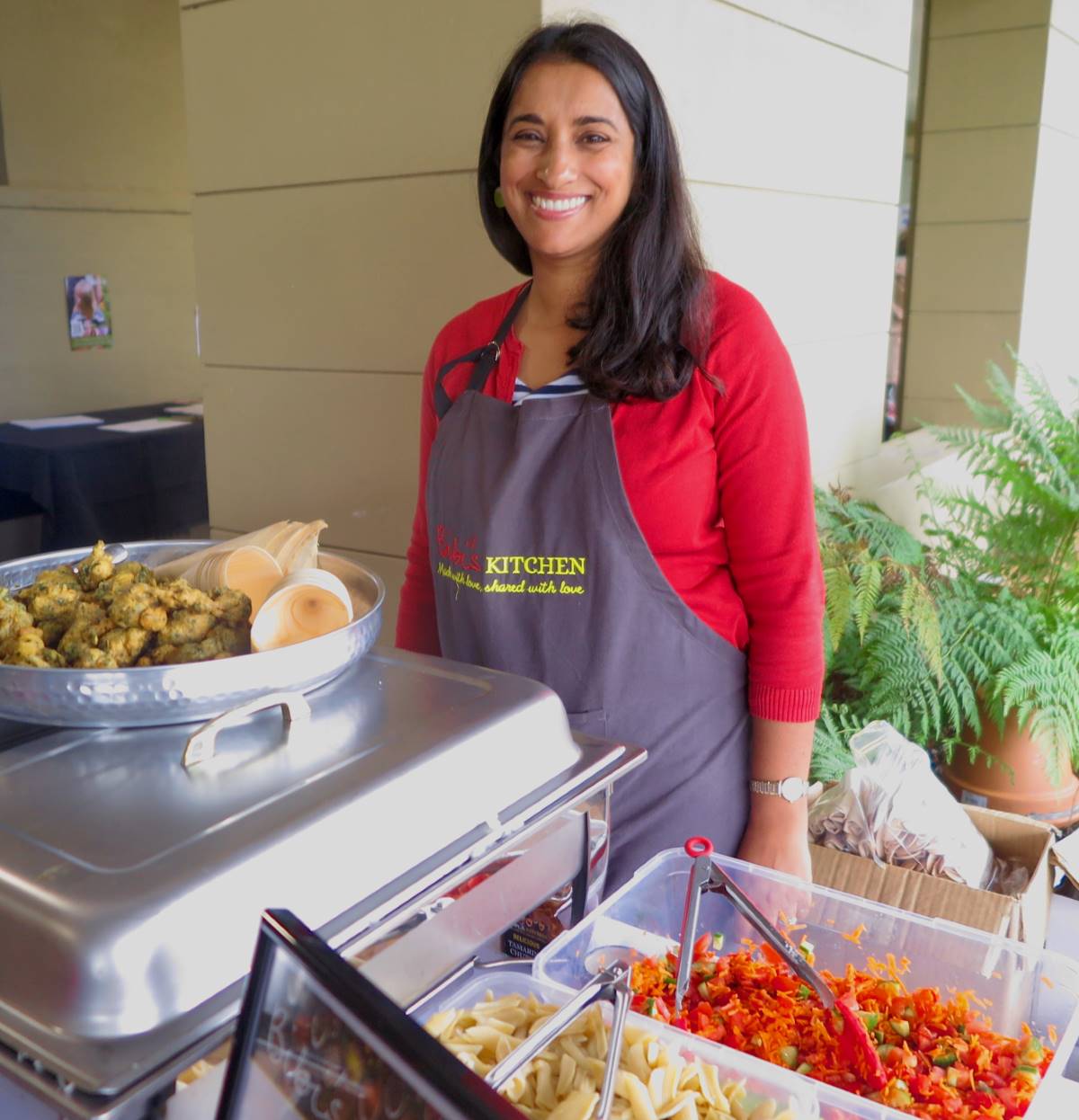
Lentil and vegetarian dishes from Bibi’s Kitchen: great for people and planet. (Photo: Linda Moon)
Roasters With Altitude did a busy trade in sustainable, fair-trade coffee. They also tempted the crowds with their vegan hot dog, sweet treats and cakes.
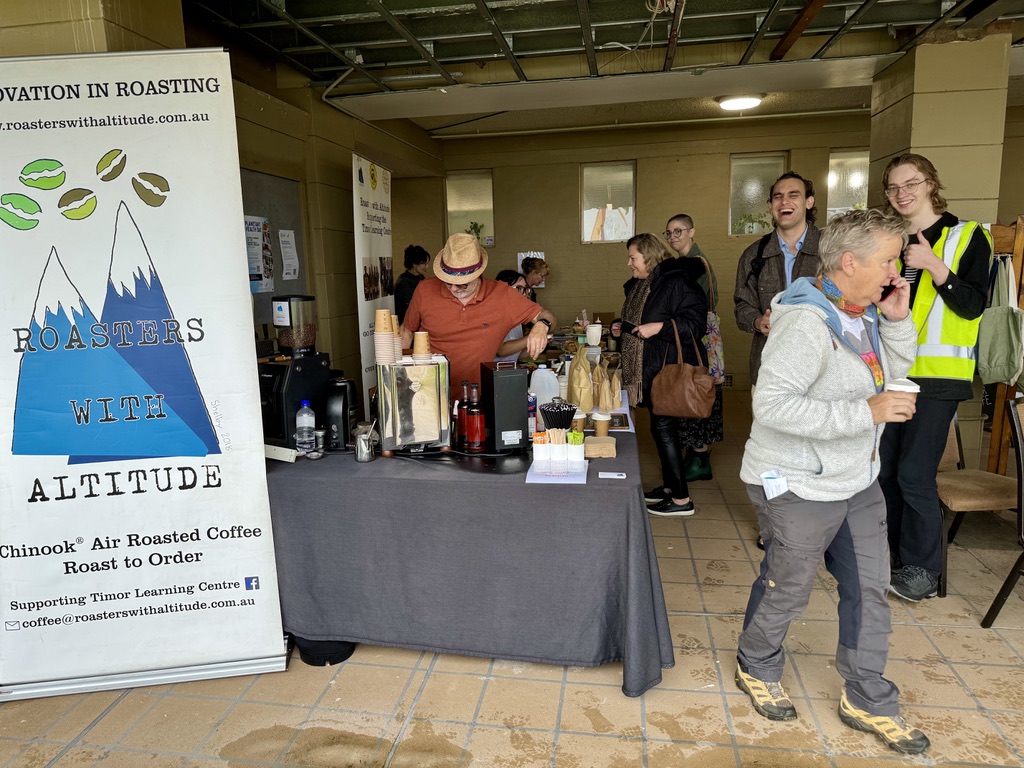
Roasters with Altitude supporting the Timor Learning Centre (Photo: Lis Bastian)
Attendees also had a chance to taste-test vegan cheeses, and partake in a vegan ‘how-to-make-your-own-cheese’ demonstration by Teya Brooks Pribac.
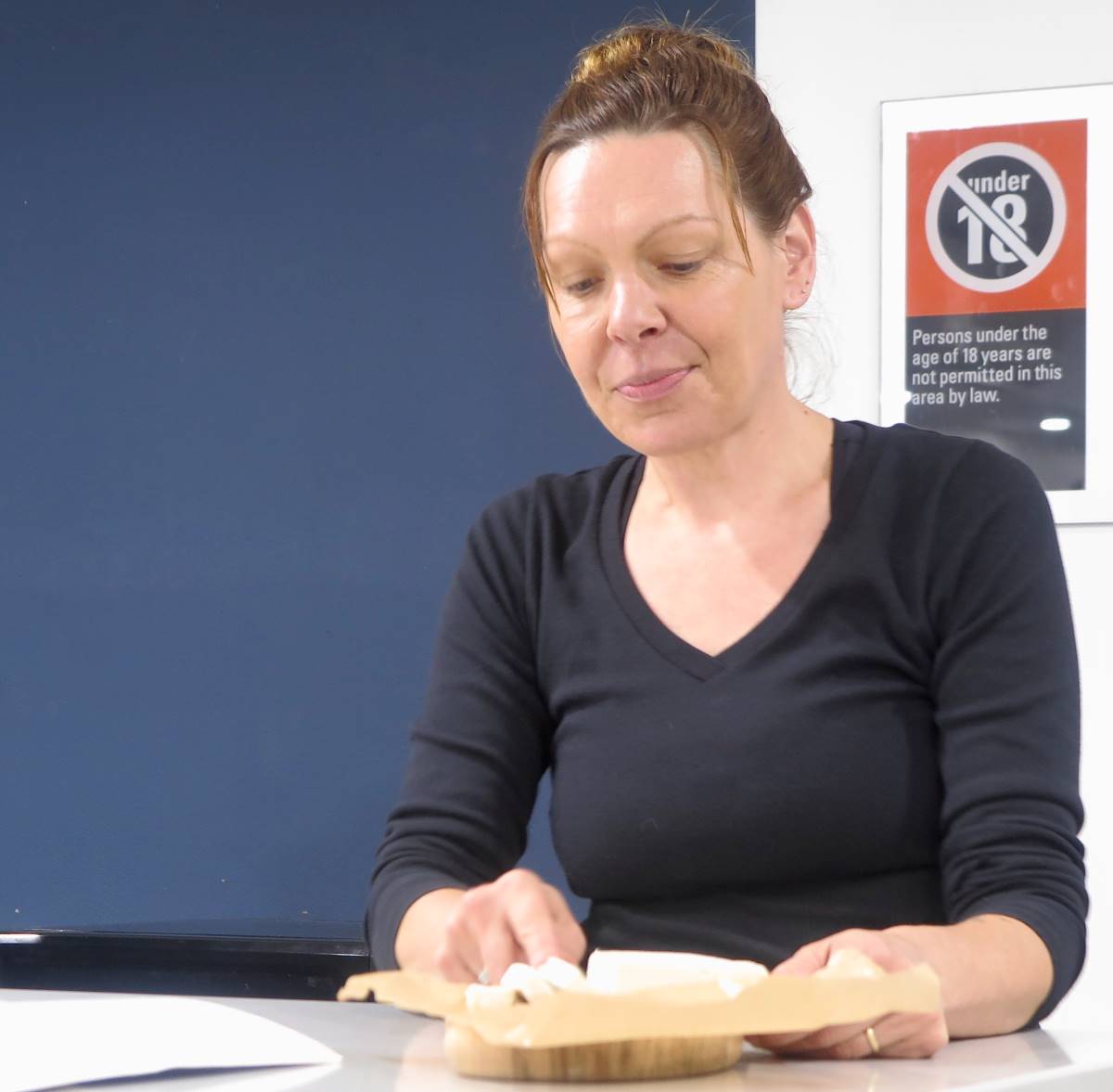
Vegan cheese-making workshop by Teya Brooks Pribac, author of Not Just Another Vegan Cookbook. (Photo: Linda Moon)
Electric vehicles
EV owner Alan Wardrop turned up on the day to share the how-to of having an electric vehicle with interested members of the public. He was joined by some of Blue Mountains City Council’s EV fleet drivers willing to share their everyday experience of driving an electric car in the Blue Mountains.
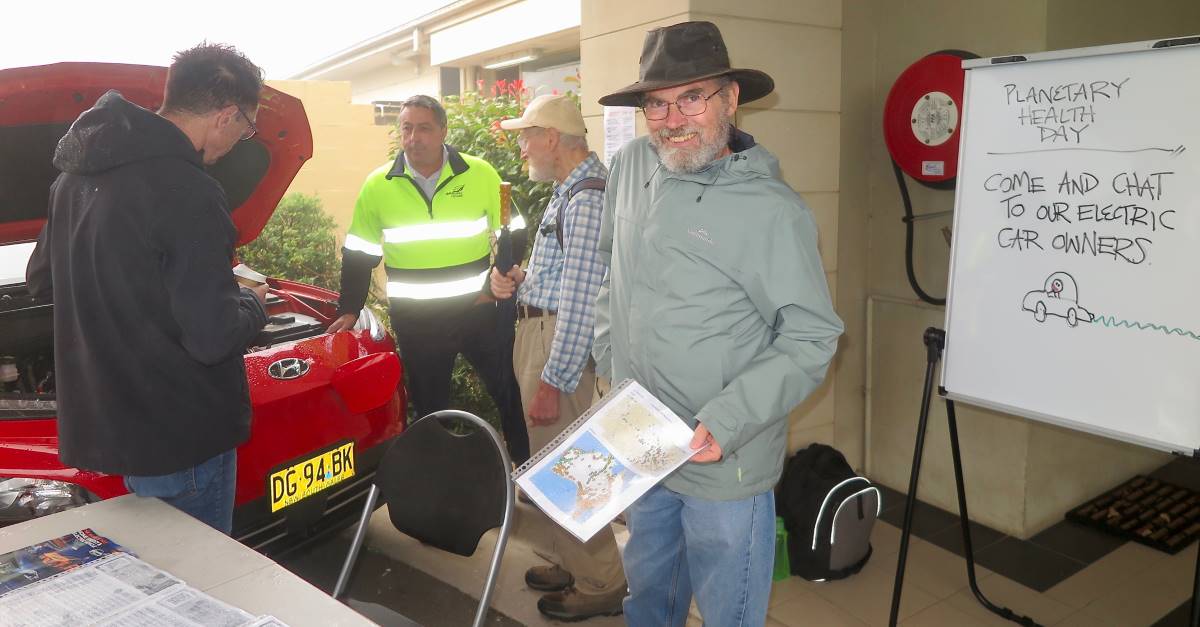
Electric car owners generously gave their time to chat to the public. (Photo: Linda Moon)
Volunteering
“Volunteering with others in the wider community trying to make a difference is another way to support the planet”, Lis said.
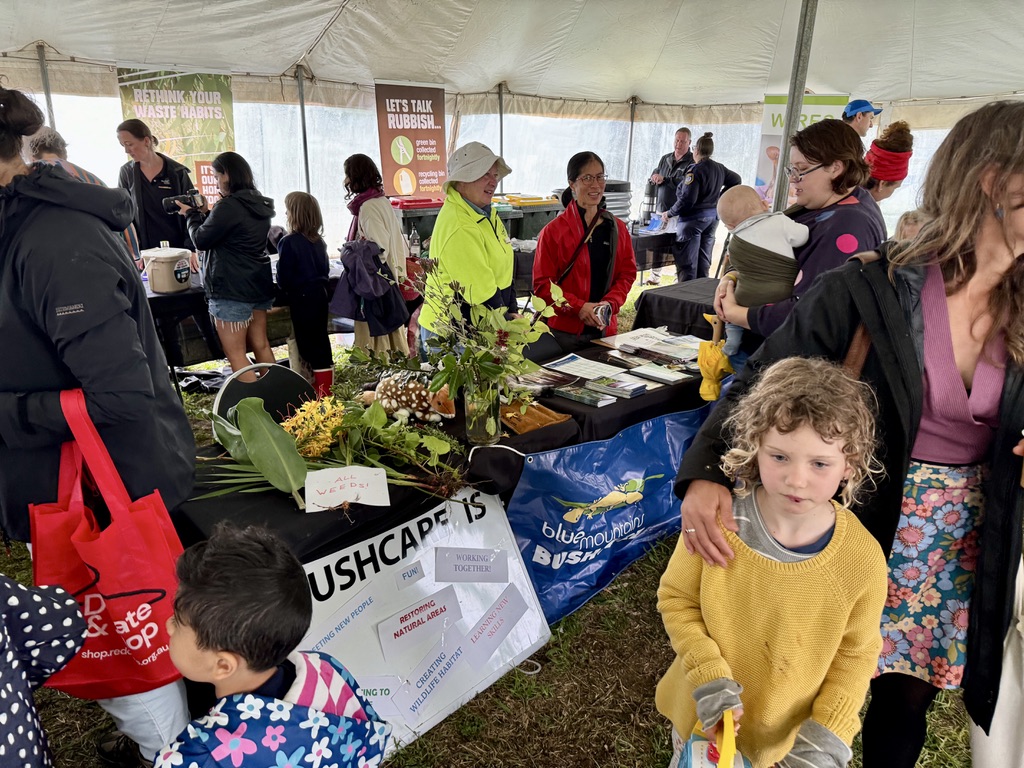
Blue Mountains Bushcare encouraging more people to engage with nature and protect our bushland. (Photo: Lis Bastian)
For those with an interest in volunteering, representatives from Blue Mountains Conservation Society, Blue Mountains World Heritage Institute, Blue Mountains Wildplant Rescue Service, WIRES, Mid Mountains Seedsavers, Blackheath Community Farm, Permaculture Blue Mountains, Blackheath Art Society, Blue Mountains Parents for Climate, Resilient Blue Mountains, South Katoomba RFS and Blue Mountains Bushcare were available for a friendly chat. The RFS was also at hand to provide tips on fire safety.
Student Dylan McCarthy was also encouraging everyone to sign up to his Petition calling for urgent action on Climate Change.
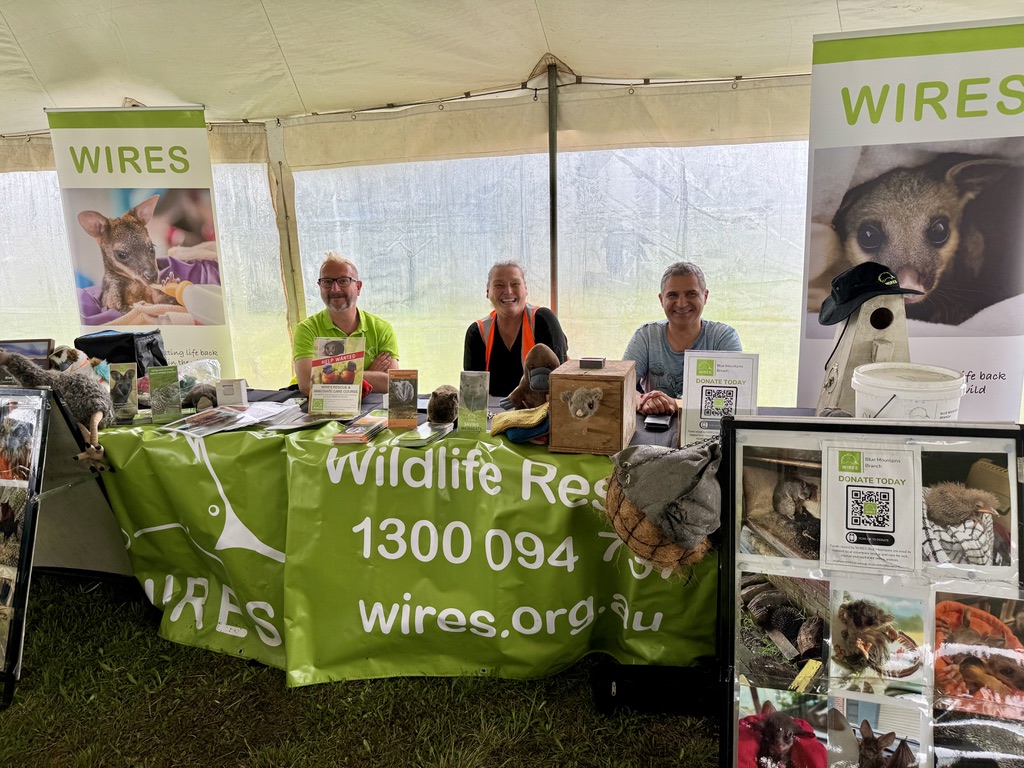
WIRES: Helping wildlife is critical to the health of the planet. (Photo: Lis Bastian)
Exhibits, art and culture
The local arts community also got in on the act. Blackheath Art Society and local artist Julie Paterson of Cloth hosted a big, collaborative drawing workshop called “Everyone Can Draw”.
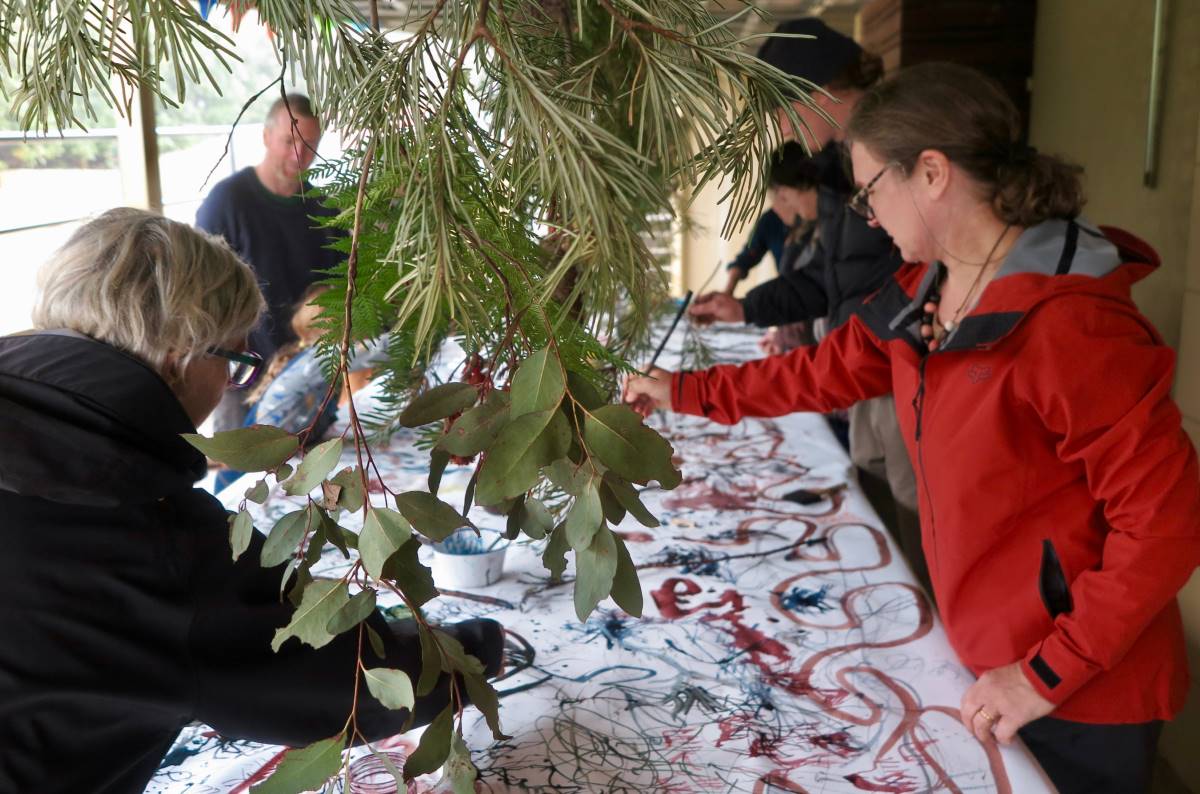
Collaborating on art. Planetary health requires working together! (Photo: Linda Moon)
Visitors also enjoyed the onsite ‘Water For Life’ exhibition.
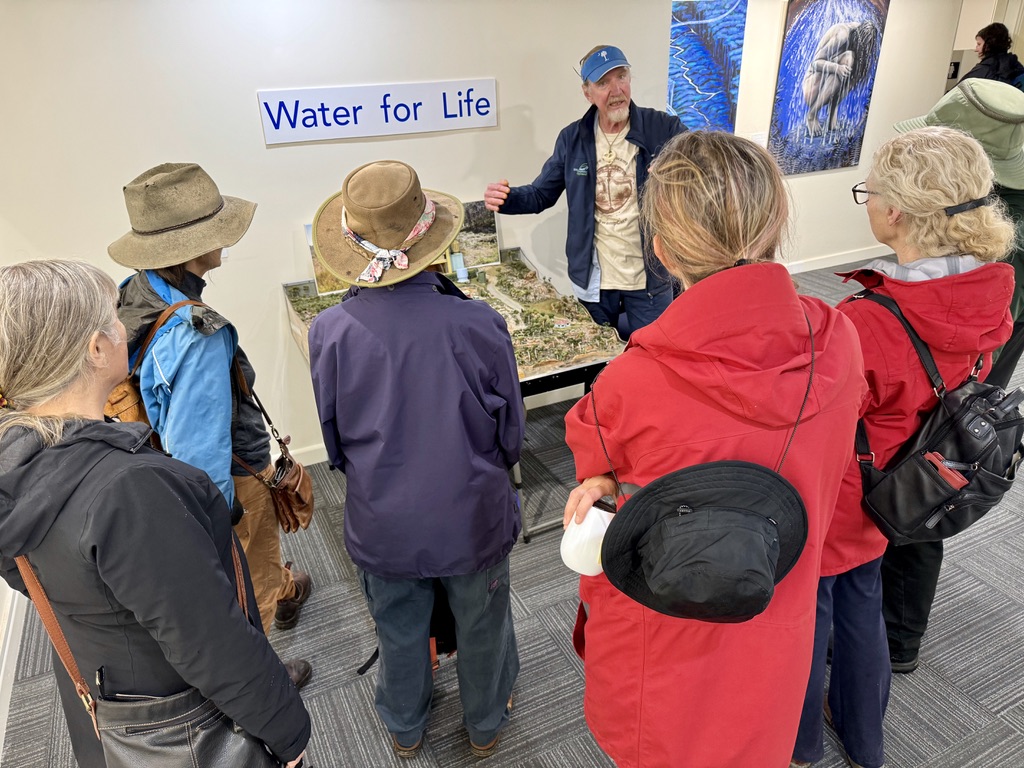
Geoffrey Smith from Council’s Healthy Waterways Team explained how our actions affect water throughout the catchment in the Water for Life Exhibition (Photo: Lis Bastian)
Ending the day, the internationally acclaimed Bowerbird Collective enchanted listeners with a live performance and helped everyone experience that they were part of nature.
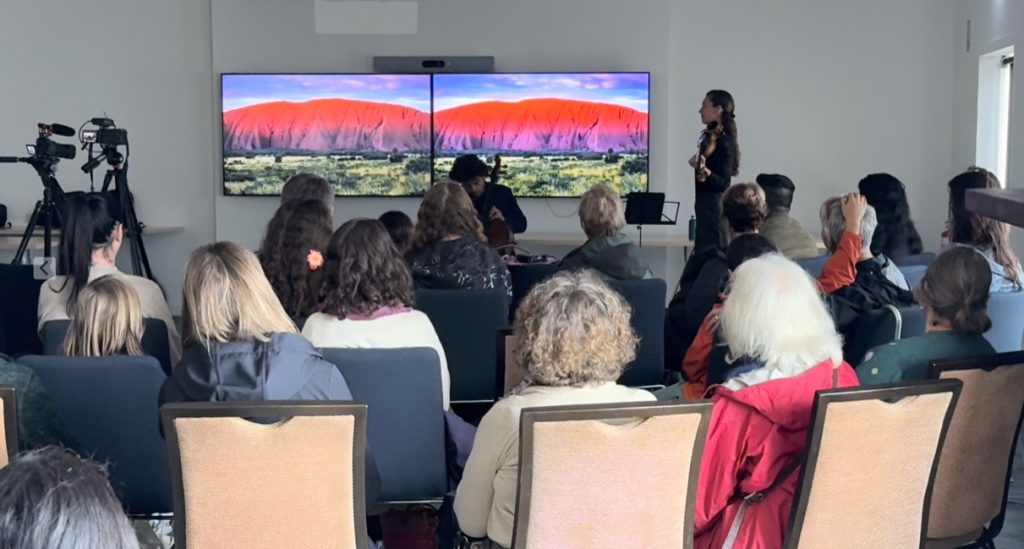
The Bowerbird Collective gave a stunning and interactive musical and visual art peformance. (Photo: Lis Bastian)
Support for Planetary Health Day comes from a Disaster Risk Reduction Fund jointly funded by the Australian and NSW governments.
With the event dubbed a success by everyone involved, it’s hoped that Planetary Health Day can become a regular event in the Blue Mountains calendar.
Take Action:
- Connect to local businesses and organisations from Planetary Health Day and find out how you can volunteer and contribute.
- Plant some seeds or seedlings and start growing your own food.
- Tick off three or more items on your sustainability list – like reducing your waste, growing some veggies, eating more plant-based food or upcycling secondhand clothing.
Share this article:
This story has been produced as part of a Bioregional Collaboration for Planetary Health and is supported by the Disaster Risk Reduction Fund (DRRF). The DRRF is jointly funded by the Australian and New South Wales governments.
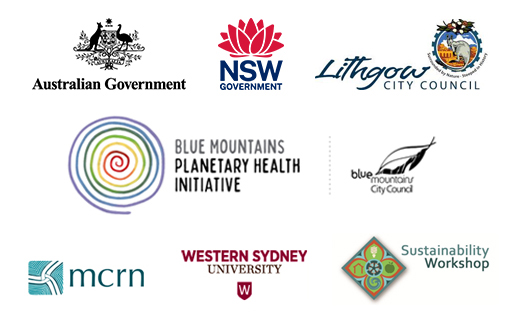
More from around the region
It was gloriously sunny and we had a fabulous day of sharing at the Planetary Health Centre yesterday, from T`ai-chi to workshops on the Frogs of the Blue Mountains, Fashion Upcycling and How to Build a Survival Garden in the Blue Mountains. We finished with a Bushcare session in which we enjoyed the beautiful bushland on the site and removed invasive weeds to expand the habitat for wildlife around our swamp. We were joined by frogs in our pond and the little echidna who returned for a swim! Thank you to everyone who shared so generously. We tasted Yacon and shared rhizomes, Purple Congo Potatoes, Oca, Turmeric, and seeds for Salsify, Egyptian Spinach, Red Mustard, Echinacea, Parsley, Chard, Radish, and Red Noodle Beans. Our next Skillshare Saturday will be on the first Saturday of May. If you`d like to be notified of all our workshops, and the meetings of our Seed Saving and Gardening Groups, subscribe to receive the fortnightly Planetary Health newsletter at any of our Local News sites like www.katoombalocalnews.com (links in profile) #skillshare #planetaryhealth #taichi #qigong #frogs #bluemountains #katoomba #fashionupcycling #upcyclingfashion #survivalgardens #seedsaving #loofah #community
Our Skillshare Saturdays are on the 1st Saturday of every month and we`re looking forward to a beautiful sunny day tomorrow for our first Morning T`ai-chi & Qigong. Fashion Upcycling is booked out this month, but we still have a few places for Frogs of the Blue Mountains, Building a Survival Garden and Planetary Health Bushcare. Bookings via Eventbrite (links in profile). For more information ph. 0407 437 553
#skillshare #planetaryhealth #sunnyday #katoomba #bluemountains #taichi #qigong #frogs #seedsaving #survivalgardens #bushcare
Imagine, if just once a month, everyone gave a few hours back to nature to repair the damage we`ve done. We would so quickly restore the habitat of so many species struggling to survive and provide the habitat for many more to flourish. Once a month, for three hours, our Planetary Health Bushcare group does just that. We`re repairing the damage of human impact and being immediately rewarded by our time in nature and the great company of the other members of our Bushcare Group. We`ll be meeting again this Saturday 5 April at 1.30pm and all are welcome to join us and learn more. Contact Karen Hising at [email protected] or call the Bushcare Office on 4780 5623 if you`d like to give it a try.
For more information about the Planetary Health Centre and how you can get involved contact the Planetary Health office on 0407 437 553
#bushcare #biodiversity #wildlife #habitat #regeneration #planetaryhealth #community #allinthistogether #bushcare #katoomba #bluemountains
In our `How to Build a Survival Garden in the Blue Mountains` workshop on Saturday 5 April, we`ll be starting an Upper Mountains Seed Saving group and sharing seeds, tubers, recipes for more unusual foods, and information about the many ways we can create more food system diversity and resilience. Learn about skirret, salsify, collards, cardoons, sea kale, Good King Henry, mangel wurzel, oca, yacon and more. Places are limited so bookings essential here (link in profile) : bit.ly/4kVAUA8
#foodsystems #foodsecurity #fooddiversity #foodresilience #biodiversity #planetaryhealth #healthydiet #plantbased #katoomba #bluemountains
Was that a frog or cricket you heard? Check out our video matching the photos of the 20 frogs of the Blue Mountains Mountains with their calls so you can learn the difference. View our exhibition, learn how to use the FrogID app, and how to build a frog pond and frog hotel, at our workshop this Saturday 5 April at 9am. Bookings via via link in profile. You can view our full video on YouTube (link in profile). Subscribe for more great content. #frogs #bluemountainsfrogs #planetaryhealth #katoomba #frogcalls #exhibition #workshop
A huge thank you to the Blue Mountains Interfaith Group for organising an inspiring afternoon that brought community together and renewed our sense of connection, hope, wonder, shared purpose and commitment to care for our extraordinary planet. We had a full house with the Frogs of the Blue Mountains looking over our shoulders! Next Saturday 5 April we`ll be launching Saturday morning T`ai-chi and Qigong which will continue on the first Saturday of every month. Bookings essential here (link in profile): bit.ly/3Rn9RzY #interfaith #hope #wonder #commitment #connection #community #planetaryhealth #katoomba #bluemountains #taichi #qigong
Our Planetary Health Newsletter is out! Read it here https://bit.ly/4l7sC89 (link in profile) to find out how Planetary Health has been at the core of Blue Mountains City Council`s Sustainability Model and Map for Action for 25 years and what it means; watch our `We Are Nature` video and our latest video on the Frogs of the Blue Mountains and all their calls; read about how we`re focusing on what connects us, not what separates us, at the Interfaith Gathering this Sunday 30 March; learn how you can take action for Planetary Health on Saturday 5 April with T`ai-chi & Qigong, workshops on the Frogs of the Blue Mountains and building Survival Gardens; and participating in Planetary Health Bushcare. There`s also still time to apply for our Conference and Events Organiser position at the Planetary Health Centre. You can subscribe to receive the newsletter at any of our local news sites, like www.katoombalocalnews.com (link in profile)
@ph_alliance
#planetaryhealth #sustainability #jobs #taichi #qigong #survivalgardens #frogs #bluemountains #katoomba #mapforaction #sustainabilitymodel #wearenature #interfaith #bushcare #community #action


